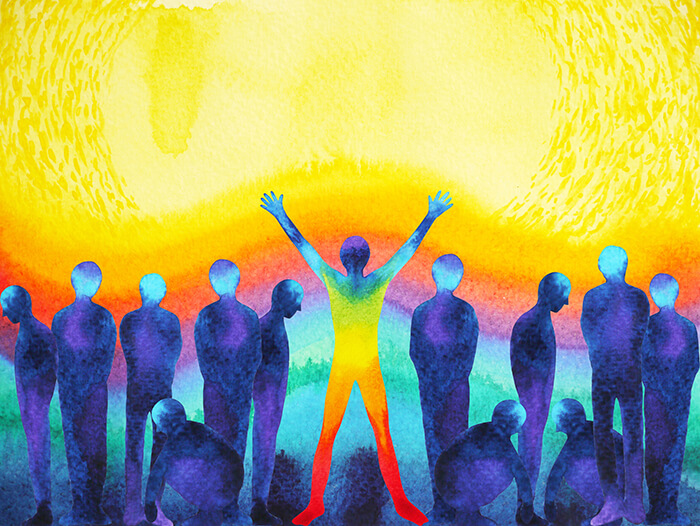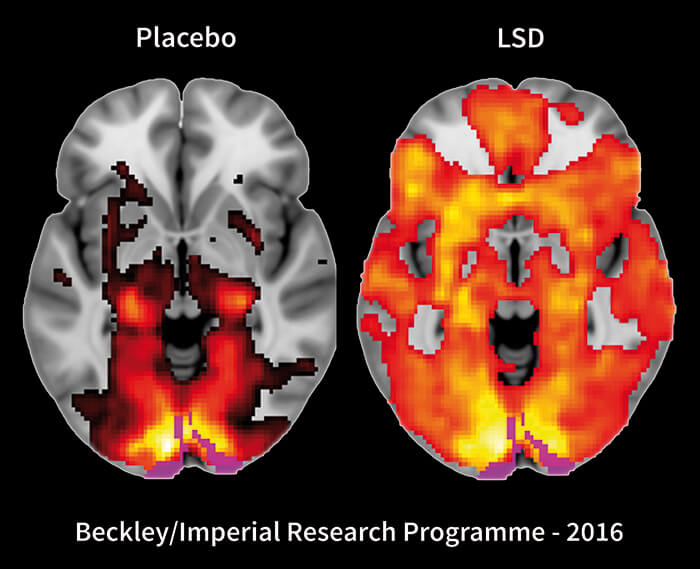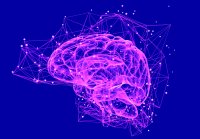
What Is The Ego, And How Do Psychedelics Shut It Down?

The conflicts, alliances and relationships that drive human history are all products of our capacity for self-awareness. Without the ability to recognise ourselves as bounded individuals with atomised personal identities, concepts like power, ownership and responsibility would not exist. Also known as the ‘ego’, this sense of separation from the rest of the universe tends to dissolve when we take psychedelics, which makes these substances the perfect tools for investigating the neurobiological roots of this phenomenon.
Though it’s often associated with selfishness and greed, the ego isn’t necessarily a bad thing, and is actually vital for survival. Some animals that lack the intelligence for self-awareness still have an instinctive notion of their own identity, and therefore act in ways that favour their own prosperity. For example, certain pack animals have an in-built awareness of their social status, and will fight with one another in order to enhance their standing and gain access to mating rights.
In humans, the ego is much more evolved, and allows us to conceptualise our identities on an intellectual level. An overdeveloped ego can therefore be problematic, as people who have trouble accepting who they are can suffer from depression, while those who are a little too fond of themselves can become arrogant and self-centred.
Back in the 1960s, Amanda Feilding – the founder and director of the Beckley Foundation – helped to elaborate a theory about the roots of the ego, which was originally put forward by her friend and mentor, Bart Huges. According to this hypothesis, the ego evolved as a biological mechanism that helps us ensure our own survival, and arises as blood is directed towards the areas of the brain that process self-awareness, and away from other regions.
After experiencing the profound transpersonal insights generated by LSD, Feilding and Huges began to suspect that psychedelics divert blood away from these egotistical brain regions, reducing their control over consciousness and weakening the ego.
Half a century later, brain imaging studies are starting to reveal what happens when the ego is shut down by psychedelics, providing some intriguing clues as to what produces it in the first place.

Brain scans revealed how alterations in connectivity under LSD correlate with the subjective experience of ego-dissolution
A recent Beckley/Imperial study found that under the effects of psilocybin, many participants experienced sensations of self-transcendence and oneness with the universe, also known as ‘ego-dissolution’. Brain scans revealed that this effect was correlated with a decrease in connectivity between brain regions called the medial temporal lobe and the parahippocamus, both of which are associated with processing aspects of selfhood.
The same study also revealed that the disappearance of the ego coincided with a decrease in alpha brainwaves in a brain region called the posterior cingulate cortex, which is a key node of the brain’s default mode network (DMN). The DMN is heavily implicated with maintaining a sense of self, and is responsible for processing autobiographical memories and self-reflection, among other elements of selfhood.
These findings were then expanded on by the first ever imaging study of the human brain on LSD, also conducted by the Beckley/Imperial Research Programme. Once again, ego-dissolution was found to correlate with a shutting off of the DMN. In particular, connectivity between two DMN regions called the parahippocampus and the retrosplenial cortex was seen to decrease as participants experienced their sense of self dissolve.
Thanks to studies like these, we’re finally beginning to understand what the ego is, and evidence is stacking up in favour of the theory put forward by Bart Huges and Amanda Feilding all those years ago: it seems that by causing the disintegration of certain brain networks, psychedelics do in fact switch off our innate awareness of ourselves as separate from the rest of the universe.
If used wisely, this knowledge could one day guide the development of novel psychotherapeutic techniques in order to tame the ego in cases where it is overdeveloped, thereby soothing many of our existential and emotional disorders.
Image: Benjavisa Ruangvaree/Shutterstock
Words: Benjamin Taub
Podcast
- All
Links
- All
Support
- All
BIPRP
- All
Science Talk
- All
Amanda's Talks
- All
- Video Talk
- Featured
- 2016 Onwards
- 2011-2015
- 2010 and Earlier
- Science Talk
- Policy Talk
One-pager
- All
Music
- All
Amanda Feilding
- All
Events
- All
Highlights
- All
Psilocybin for Depression
- All
Current
- All
Category
- All
- Science
- Policy
- Culture
Substance/Method
- All
- Opiates
- Novel Psychoactive Substances
- Meditation
- Trepanation
- LSD
- Psilocybin
- Cannabis/cannabinoids
- Ayahuasca/DMT
- Coca/Cocaine
- MDMA
Collaboration
- All
- Beckley/Brazil Research Programme
- Beckley/Maastricht Research Programme
- Exeter University
- ICEERS
- Beckley/Sant Pau Research Programme
- University College London
- New York University
- Cardiff University
- Madrid Computense University
- Ethnobotanicals Research Programme
- Freiburg University
- Medical Office for Psychiatry and Psychotherapy, Solothurn
- Beckley/Sechenov Institute Research programme
- Hannover Medical School
- Beckley/Imperial Research Programme
- King's College London
- Johns Hopkins University
Clinical Application
- All
- Depression
- Addictions
- Anxiety
- Psychosis
- PTSD
- Cancer
- Cluster Headaches
Policy Focus
- All
- Policy Reports
- Advisory Work
- Seminar Series
- Advocacy/Campaigns
Type of publication
- All
- Original research
- Report
- Review
- Opinion/Correspondence
- Book
- Book chapter
- Conference abstract
- Petition/campaign
Search type


